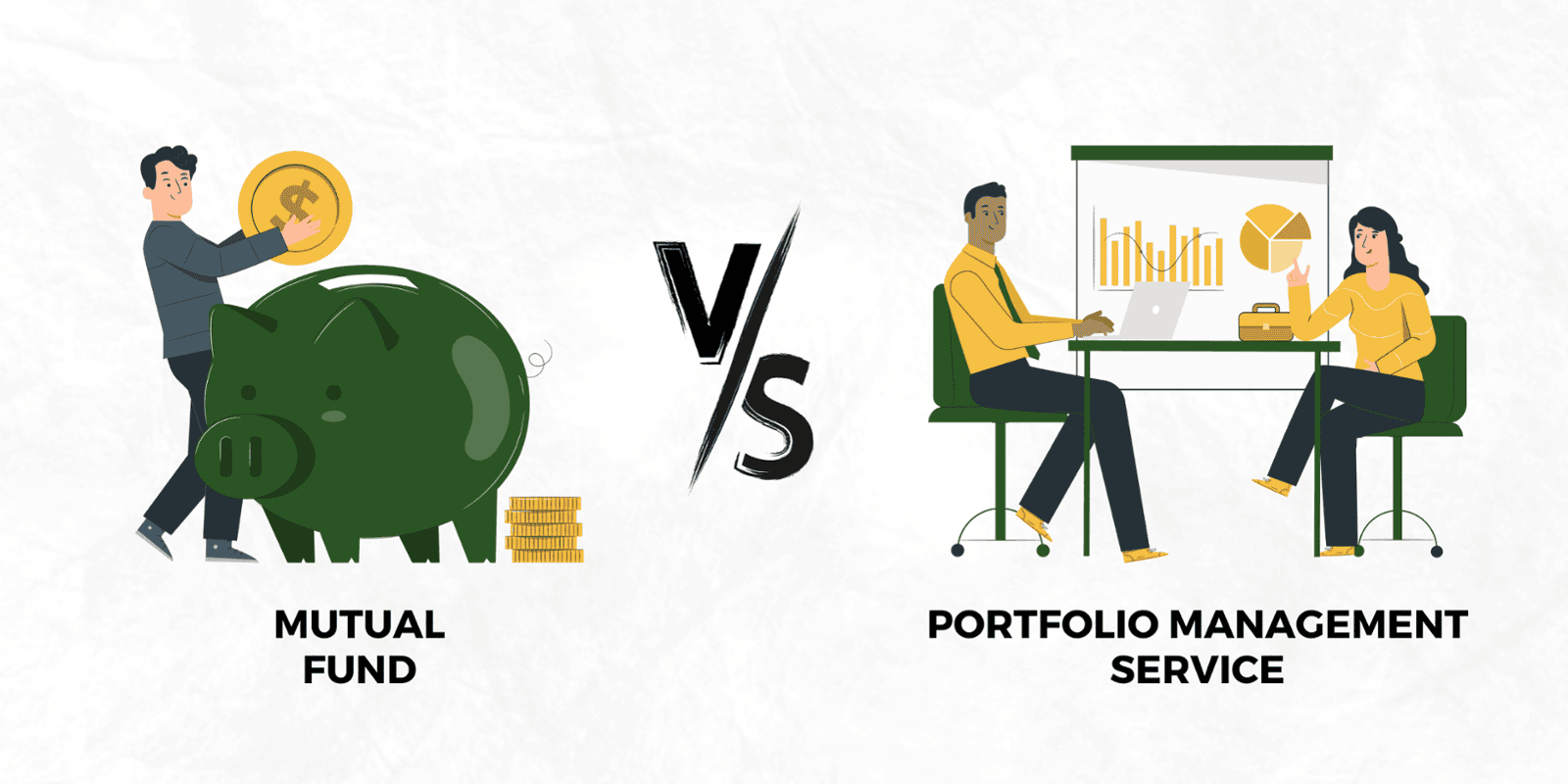
Mutual funds offer diversification, expert management, and attractive returns in the long run to investors, making them a popular investment choice in India. While mutual funds suit investors of all sizes, if you have a large investment portfolio, looking beyond mutual funds can prove beneficial for you, i,e., direct equity ownership via Portfolio Management Services (PMS).PMS is a specialised investment approach, aimed at providing tailored wealth management to high-net-worth individuals. The question is how PMS compares to mutual funds and why should you as an investor look beyond mutual funds. Let’s understand in this article.
Overview and Importance of Portfolio Management Service
PMS offers expert fund management. It is suitable for high-net-worth individuals who have a minimum investment of ₹50 lakhs.Unlike mutual funds, PMS gives you direct ownership of stocks and better control over portfolio allocations, especially if you have a large portfolio. You get a customised portfolio that aligns with your specific risk appetite and financial goals along with competitive returns (subject to the skills of fund managers).For instance, in the last one year (September 2023 to August 2024), around 14 PMS schemes delivered over 70% returns. During the same period, the BSE Sensex rose 27%, while the BSE MidCap and BSE SmallCap indices jumped 57% and 50%, respectively.Once your portfolio size grows, you need better control and flexibility over your investment, for which PMS can prove more suitable.
What Are the Features of PMS?
Here are the features of PMS that you need to know:
Personalised Portfolio Construction
One of the features of PMS is the tailored approach to portfolio construction. The portfolio manager assesses your requirements and crafts an investment plan that takes into account your objectives and comfort level with risk.
Professional Management
When you opt for PMS, you gain access to seasoned professionals who have extensive knowledge and expertise in managing investments.
The High Minimum Investment Threshold
As per the Securities and Exchange Board of India (SEBI) regulations, the minimum investment threshold for PMS is ₹50 lakh. Earlier, it was ₹25 lakh.
Flexibility in Investment Choices
As an investor, you have direct ownership of the securities in your portfolio. Portfolio managers have the freedom to create a concentrated portfolio of 15-25 well-researched companies, which can potentially generate superior long-term performance. Additionally, PMS providers have the flexibility to hold cash depending on market conditions. In theory, a PMS manager can go up to 100% in cash if they deem it necessary.This flexibility allows for strategic positioning in response to market fluctuations and can help protect your portfolio during turbulent times.
What Sets PMS Apart from Mutual Funds?
Here is what sets PMS apart from mutual funds.
| Portfolio Management Services (PMS) | Mutual Funds |
Investment Objectives and Strategies | Personalised investment approach, tailored to specific financial goals and risk tolerance. More focused portfolio. | Predefined investment objectives and strategies. Pools money from multiple investors to invest in a diversified portfolio of securities (stocks, bonds, etc.). |
Diversification and Risk Management | Offers some diversification but may have a more concentrated portfolio, which increases volatility risks; greater potential gains or losses in specific sectors or stocks. | Typically offers better diversification across sectors and asset classes and helps mitigate risk by spreading investments across multiple securities. |
Cost Structures | Higher fees; Charges may include: accounting, custody, brokerage, exit load, performance fees, and management fees. | Lower fees due to pooled investments; more straightforward fee structure.
|
Fees | Fees typically range from 2% to 2.5% of assets under management. Performance fees may range from 10% to 30% of excess returns. | Charges an expense ratio, usually between 0.5% and 2.5% of the fund's assets under management. |
Regulatory Framework and Investor Protection | Less regulatory scrutiny by SEBI. Providers disclose investment approach and strategy but not specific holdings or weightings. | Stringent oversight by SEBI; required to regularly disclose portfolio holdings, performance, and expenses. |
Transparency | Lower transparency due to private investment arrangements between fund managers and investors. | Greater transparency and regulatory protection for investors. |
Your choice between PMS and mutual funds in India should depend on your investment goals, risk appetite, and financial situation. If you're a high-net-worth individual seeking a tailored investment approach and are comfortable with higher fees and potentially higher risks, PMS might be suitable for you.However, if you prefer a more diversified, transparent, and cost-effective investment option, mutual funds could be the better choice.
What Should Investors Consider to Invest in PMS?
Here are key factors that can help you with investing in PMS and look beyond mutual funds.
Potential for Outperformance
PMS, through active management, targets higher returns by strategically picking high-growth stocks and sectors. This makes it suitable for investors who have a high ticket size and are willing to take risks. Looking at stats, 77% PMS funds have outperformed their benchmarks in the last 10 years.
Aggressive Investment
PMS in India often involves a more concentrated portfolio compared to mutual funds, which can lead to higher potential returns but also increased risk. You need to assess whether you Are comfortable with this level of risk and if it aligns with your investment objectives.
Investment horizon
Generally, PMS is better suited for investors with a longer investment horizon, typically 5 years or more. This longer time frame allows the portfolio manager to implement strategies that can potentially generate higher returns over time.
Liquidity Needs
Consider your liquidity needs when evaluating PMS. While PMS offers some flexibility, it may have certain restrictions on withdrawals or require a minimum investment period. You need to ensure that your investment in PMS doesn't compromise your ability to meet short-term financial obligations or unexpected expenses.
Use of Advanced Strategies
If you compare mutual funds with PMS, the latter adopts an advanced approach. Because PMS providers can have high flexibility, they can also use advanced strategies, i.e. sector rotation, value investing, and growth-at-a-reasonable-price (GARP) to achieve attractive returns for investors.
Tax implications
Every investment attracts taxes. The same is true for PMS. However, in PMS, your portfolio is managed by a fund manager and the assets are direct ownership. Thus, whenever the fund manager sells off an asset, it is treated as capital gains. Your investments in PMS attract capital gains tax.For equity, short-term capital gains (STCG) are taxed at 20%, while long-term capital gains (LTCG) are taxed at 12.5% for gains exceeding ₹1.25 lakh. Additionally, dividend income from PMS investments is taxable at your applicable income tax slab rate.This is not the same for mutual funds. While mutual funds also attract capital gains tax, if a fund manager sells an asset, the tax is not treated at the hands’ of investors. It is only when an investor sells the units of the mutual funds, that the tax is applicable.
Conclusion
Portfolio Management Services in India offer HNIs as an alternative to mutual funds. With a minimum investment of ₹50 lakhs, PMS offers you a personalised approach to portfolio creation and management as per your individual goals and risk appetite. This personalised approach, coupled with direct stock ownership and active management, has the potential to yield better returns over the long term, especially for aggressive investors.


